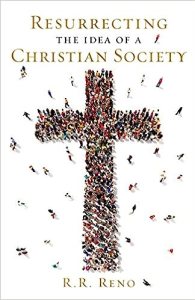- Feb 5, 2002
- 166,650
- 56,274
- Country
- United States
- Faith
- Catholic
- Marital Status
- Married
- Politics
- US-Others
Resurrecting the Idea of a Christian Society, by R.R. Reno (256 pages, Salem Books, 2016)It is only through re-infusing the political order with Christian truths and reconnecting it to its transcendent sources that the renewal for which we hope can be achieved.

In 1939, as the storm clouds of World War II were gathering in Europe, famed modernist-poet-turned-Anglo-Catholic, T.S. Eliot, penned an essay entitled “The Idea of a Christian Society,” in which he lays out a vision of a Christian society over and against the powerful totalitarian ideologies of communism and fascism. Eliot, however, is careful to say that he is less interested in producing anti-communist or anti-fascist arguments than he is in examining “the more profound differences between pagan and Christian society.” Still, for Eliot, only a society that recognizes God can have any means by which to resist—and indeed, any justification for resisting—the worst excesses of paganism. As he famously declares: “If you will not have God (and He is a jealous God) you should pay your respects to Hitler or Stalin.”
Today, the Stalin and Hitler regimes are now long since relegated to the dustbin of history, but the conflict between neo-paganism and Christianity continues in the West. Indeed, in the seventy-seven years since Eliot’s essay was written, the conflict has greatly intensified, and Christianity once again finds itself in retreat, though this time from a very different adversary. Rather than totalitarian ideologies of the communist or fascist sort—“comprehensive doctrines,” in Rawlsian terms, complete with their own internal systems of truth—Christianity is now faced with a new ideology whose overarching ethic consists in what Pope Benedict XVI called the “dictatorship of relativism.” The primary behavioral expectation of this dictatorship is “non-judgmentalism”: that is, refusing to pass judgment on the lifestyle choices of others.
It is this paradigm that R.R. Reno, editor of the influential journal First Things and former theology professor, seeks to challenge in his new book Resurrecting the Idea of a Christian Society. A clear allusion to Eliot’s earlier work, Dr. Reno seeks to revisit and update Eliot’s conception, though in a less abstract manner.
The choice we face today, Reno argues, is the same as that of Eliot’s day: “Will we seek to live in accord with the idea of a Christian society, or will we accept the tutelage of a pagan society?” But the nature of that dichotomy looks very different today than it did then. As Alexis de Tocqueville warned in the preface to the Old Regime and the Revolution, a danger of democratic societies is that “the ruling passions become a desire for wealth at all cost, a taste for business, a love of gain, and a liking for comfort and material pleasures,” as the result of a tendency for democratic citizens “to wrap themselves up in a narrow individuality in which public virtue is stifled.” What we suffer from now cannot be remedied by appeals to increased individual liberty as it could in the face of mass political movements—or “political religions” as Eric Voegelin called them—like communism and fascism. This is because the ailment is not one of too little individualism, but too much: What we lack in modern America is solidarity.
Continued below.

Resurrecting the Idea of a Christian Society
It is only through re-infusing the political order with Christian truths and reconnecting it to its transcendent sources that the renewal for which we hope can be achieved. (essay by Shaun Rieley)
 theimaginativeconservative.org
theimaginativeconservative.org
